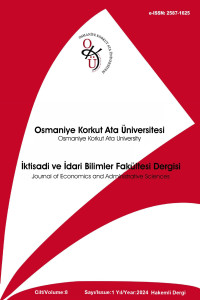Öz
Yeşil teori diğer eleştirel teorilerin de genel özelliği olan kurtuluşu (emancipation) sağlama çabası içindedir. Feminist teori, kadınların erkek egemenliği ve baskısından kurtulmasını ana amacı olarak alıyorsa, yeşil teori de doğanın insan egemenliği ve sömürüsünden kurtulmasını temel sorunsalı olarak almaktadır. Diğer eleştirel teorilerle ortak amaç gütmekte, kısacası mevcut sistemi eleştirerek sistemde köklü bir değişiklik yapılması ihtiyacını gündeme getirmektedir.
Anahtar Kelimeler
Yeşil Teori Uluslararası İlişkiler Disiplini Eleştirel Teori Kurtuluş İnsan Sömürüsü
Kaynakça
- Aydın, M. (1996). “Uluslararası İlişkilerde Yaklaşım, Teori ve Analiz”, Ankara Üniversitesi Siyasal Bilgiler Fakültesi Dergisi, 51(1), 71-114.
- Eckersley, R. (1992). Environmentalism and Political Theory: Towards and Ecocentric Approach. New York: State University of New York.
- Eckersley, R. (2013). “Green Theory”. T.Dunne. International Relations Theory: Dicipline and Diversity, (266-283). Oxford: Oxford University Press.
- Günseli, T. (1996). Ekofeminizm Amaçları. Kadın Araştırmaları Dergisi, Sayı: 4, 81.
- Hecker, J. H. (2011). Peace and Sustainable Development Through Environmental Security: A Methodology for Environmental Security Assessments. Hague: Institute for Environmental Security.
- Leopold, A. (1949). A Sand County Almanac. Oxford New York: University Press.
- Merchant, C. (1980). The Death of Nature: Women, Ecology, and the Scientific Revolution. San Francisco: Harper & Row.
- Miller, Jr., Tyler G. (2003). Environmental Science: Working With the Earth (9th ed.). Pacific Grove, California: Brooks/Cole.
- O’Riordan, Timothy (1981). Environmentalism. 2. Baskı. Oxford: Routhledge.
- Özer, M.A. (2001). Ekolojik Harekette Yol Ayrımı: Yeşiller Ve Derin Ekoloji. Yerel Yönetim ve Denetim, 6 (9), 71.
- Paterson, M. (2005). Green Politics. Burchill S. Theories of International Relations. 235-257. New York: Palgrave MacMillan.
- Rondinelli, D. A. ve Berry, M. A. (2000). Environmental Citizenship in MultinationalCorporations: Social Responsibility and Sustainable Development, European Management Journal, 18(1), 70-84.
- Schlosberg, D. (2007). Defining Environmental Justice: Theories, Movements, and Nature. Oxford: Oxford University Press.
- Urungu A. (2014). Sürdürülebilir Kalkınma: Uygulamalı Antropolojinin Eylem Alanı, Antropoloji Dergisi, Sayı: 24, 133-164.
- Ünal, S. (2014). Yeşil Teori ve Güvenlik, Şen O. ve Çıtak E. Uluslararası İlişkiler Güvenlik Teorik Değerlendirmeler. 193-206. İstanbul: Uluslararası İlişkiler Kütüphanesi.
Öz
Green theory strives to provide liberation, which is also the general feature of critics of other theories. Feminist theory is the main aim of women's emancipation from men and their oppression, while green theory is the main problem of liberating nature from human level and exploitation. It has a common goal with other critical theories; in short, it criticizes the current system and brings up the possibility of making a change that shapes the system.
Anahtar Kelimeler
Green Theory International Relations Discipline Critical Theory Emancipation Human Exploitation
Kaynakça
- Aydın, M. (1996). “Uluslararası İlişkilerde Yaklaşım, Teori ve Analiz”, Ankara Üniversitesi Siyasal Bilgiler Fakültesi Dergisi, 51(1), 71-114.
- Eckersley, R. (1992). Environmentalism and Political Theory: Towards and Ecocentric Approach. New York: State University of New York.
- Eckersley, R. (2013). “Green Theory”. T.Dunne. International Relations Theory: Dicipline and Diversity, (266-283). Oxford: Oxford University Press.
- Günseli, T. (1996). Ekofeminizm Amaçları. Kadın Araştırmaları Dergisi, Sayı: 4, 81.
- Hecker, J. H. (2011). Peace and Sustainable Development Through Environmental Security: A Methodology for Environmental Security Assessments. Hague: Institute for Environmental Security.
- Leopold, A. (1949). A Sand County Almanac. Oxford New York: University Press.
- Merchant, C. (1980). The Death of Nature: Women, Ecology, and the Scientific Revolution. San Francisco: Harper & Row.
- Miller, Jr., Tyler G. (2003). Environmental Science: Working With the Earth (9th ed.). Pacific Grove, California: Brooks/Cole.
- O’Riordan, Timothy (1981). Environmentalism. 2. Baskı. Oxford: Routhledge.
- Özer, M.A. (2001). Ekolojik Harekette Yol Ayrımı: Yeşiller Ve Derin Ekoloji. Yerel Yönetim ve Denetim, 6 (9), 71.
- Paterson, M. (2005). Green Politics. Burchill S. Theories of International Relations. 235-257. New York: Palgrave MacMillan.
- Rondinelli, D. A. ve Berry, M. A. (2000). Environmental Citizenship in MultinationalCorporations: Social Responsibility and Sustainable Development, European Management Journal, 18(1), 70-84.
- Schlosberg, D. (2007). Defining Environmental Justice: Theories, Movements, and Nature. Oxford: Oxford University Press.
- Urungu A. (2014). Sürdürülebilir Kalkınma: Uygulamalı Antropolojinin Eylem Alanı, Antropoloji Dergisi, Sayı: 24, 133-164.
- Ünal, S. (2014). Yeşil Teori ve Güvenlik, Şen O. ve Çıtak E. Uluslararası İlişkiler Güvenlik Teorik Değerlendirmeler. 193-206. İstanbul: Uluslararası İlişkiler Kütüphanesi.
Ayrıntılar
| Birincil Dil | Türkçe |
|---|---|
| Konular | Uluslararası İlişkiler Kuramları |
| Bölüm | Makaleler |
| Yazarlar | |
| Erken Görünüm Tarihi | 1 Temmuz 2024 |
| Yayımlanma Tarihi | 1 Temmuz 2024 |
| Gönderilme Tarihi | 17 Nisan 2024 |
| Kabul Tarihi | 1 Temmuz 2024 |
| Yayımlandığı Sayı | Yıl 2024 Cilt: 8 Sayı: 1 |
Kaynak Göster


